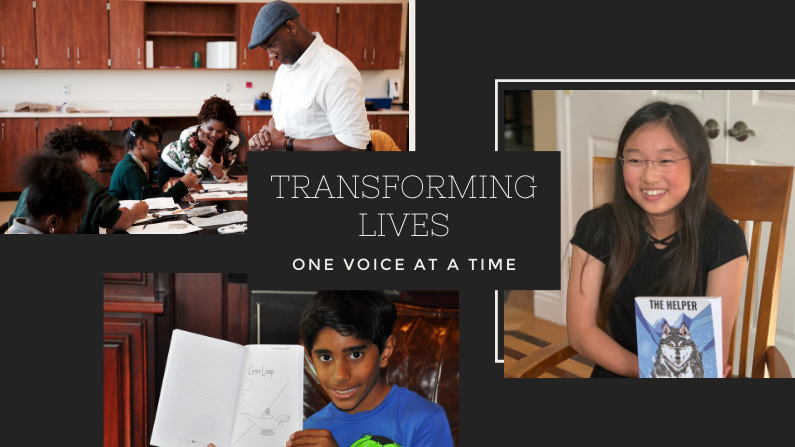Hope is difficult to measure. However when we consider its opposite—hopelessness—we know exactly why developing hope in young people is essential. No wonder a quick stroll through any bookstore’s youth section reveals story after story that celebrate light overcoming darkness, the essential hopefulness of life.
One of the comments we receive most from parents and educators about our work with youth is, “You brought out the best in them—not just in their writing, but in their overall understanding of what they were capable of achieving, of who they could be.”
To me, this feedback has always been the highest of compliments. Even so, for many years, I struggled to name this outcome. Self-confidence? Self-actualization? Recently, I’ve settled on a more simple word—hope.
It’s a fitting word when it comes to pairing kidlit authors with youth writers. After all, the reason most kidlit writers write for youth is to affirm hope through the stories they craft. Their books range from middle grade fantasy, to gritty YA fiction, to whimsical picture books, and beyond, but overall, kidlit is about the belief that we can overcome obstacles, that growth is possible, that effort and resilience leads to a better, brighter future.
As a kidlit writer myself, hope is a central theme of my own work, and yet I still struggled to nail down the concept in firm, concise language. Fortunately, Brene Brown wrote eloquently on the subject in The Gifts of Imperfection. She wrote, “I was shocked to discover that hope is not an emotion; it’s a way of thinking or a cognitive process. Emotions play a supporting role, but hope is really a thought process … a combination of setting goals, having the tenacity and perseverance to pursue them, and believing in our own abilities.”
What a fabulous, muscular definition for the heart of our goal at Society of Young Inklings. In fact, defined this way, I’d go so far as to say that our vision at Society of Young Inklings is to foster hope across a generation of youth writers.
It’s a daunting project, and a worthy one. Imagine how our world might look in fifteen or twenty years when a generation of youth writers step into adulthood with the ability to set goals, the tenacity and perseverance to pursue them, and the belief in their abilities. Imagine what it will look like next month, when those empowered youth are actively engaged in transforming their neighborhoods, their schools, and their communities.
When facing a complex problem, often the most difficult challenge is figuring how to tackle it. However, here, we already have a proven solution. Kids love stories, and even if they don’t consider themselves writers, it doesn’t take much encouragement to engage them in the storytelling process. Especially when they move past concerns about perfection and grammar, they begin to light up as they share their perspective, their ideas, their imagined worlds.
With the committed guidance of an author, youth move past the idea stage into the rewarding process of drafting, revision, and ultimately, publication in one form or another. By sharing their creations with their families, communities, and the larger world, they step into a powerful new reality, one in which they are seen and heard, one in which their voice touches hearts and makes a positive difference.
Hope becomes real for youth through this process. It becomes something they own, along with their own life story. As Brene Brown also stated, “When you own your story, here’s the power of that. You get to write the ending. So, when you say, ‘Yes, this happened to me, but I own this story, and here’s how this story’s gonna end,’ you become not the subject of the story, but you’re the narrator.”
I’d like to invite you to join us in this movement, this daunting, audacious vision of transforming individuals, their communities, and ultimately, the world, one voice at a time. You can take part in one or more of these ways.
As a starting place, we recommend our Inklings Book 2019, which features stories and poems by a collection of passionate, talented 3rd-9th grade authors.
Consider giving those youth authors a review on your favorite book site, or a shout-out on social media. If you post, be sure to tag us. On Instagram we’re @societyofyounginklings and on Twitter we’re @younginklings.
Your financial gift supports outreach to youth writers whose voices need to be heard. We thank you in advance for your gift, in any amount, which transforms individuals, their communities, and ultimately, the world, one voice at a time.


